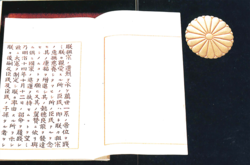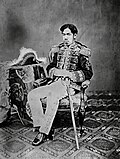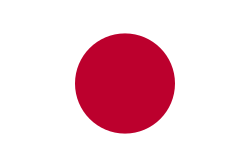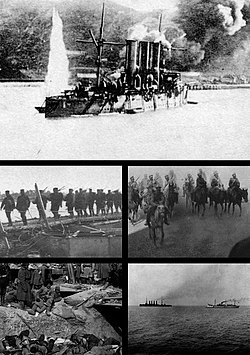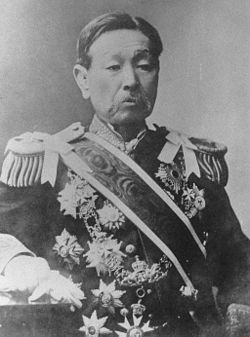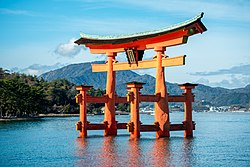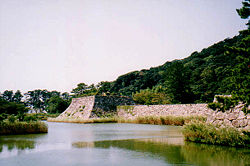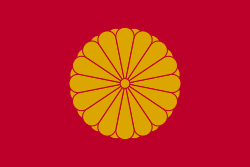The Meiji oligarchy was the new ruling class of Meiji period Japan. In Japanese, the Meiji oligarchy is called the domain clique (藩閥, hambatsu). The members...
8 KB (1,005 words) - 06:11, 20 May 2025
Japan. Politicians of the Meiji government were known as the Meiji oligarchy, who overthrew the Tokugawa shogunate. After the Meiji Restoration, the leaders...
22 KB (3,104 words) - 10:55, 20 May 2025
The Meiji era (明治時代, Meiji jidai) was an era of Japanese history that extended from October 23, 1868, to July 30, 1912. The Meiji era was the first half...
69 KB (8,339 words) - 05:42, 25 May 2025
took office in 1885, until the present day. 32 prime ministers under the Meiji Constitution had a mandate from the Emperor. The "electoral mandates" shown...
100 KB (2,763 words) - 08:56, 13 June 2025
without the government since the beginnings of the Meiji government. The conservative Meiji oligarchy viewed anything resembling democracy or republicanism...
27 KB (2,988 words) - 20:07, 30 April 2025
The Meiji Restoration (明治維新, Meiji Ishin; Japanese pronunciation: [mei.(d)ʑi iꜜ.ɕiɴ, meː-]), referred to at the time as the Honorable Restoration (御維新/御一新...
93 KB (11,810 words) - 14:48, 25 June 2025
with what had been agreed upon in advance by the Meiji oligarchy. Conversely, Herbert Bix describes Meiji as a powerful autocrat whom the Genrō struggled...
62 KB (6,234 words) - 23:27, 25 June 2025
of the shogunate and the restoration of imperial power in 1868. In the Meiji period, Japan pursued rapid industrialization and modernization, as well...
201 KB (16,629 words) - 01:58, 24 June 2025
Abolition of the han system (category Meiji Restoration)
system with a new oligarchy. After the defeat of forces loyal to the Tokugawa shogunate during the Boshin War in 1868, the new Meiji government confiscated...
6 KB (793 words) - 21:28, 29 June 2024
President of the State', was also used in the past. Before the adoption of the Meiji Constitution, Japan had in practice no written constitution. Originally...
24 KB (2,512 words) - 02:01, 25 June 2025
House of Peers could simply vote down bills deemed too liberal by the Meiji oligarchy, such as the introduction of women's suffrage, increases in local autonomy...
104 KB (2,892 words) - 20:47, 24 June 2025
when foreign policy was perceived to be pusillanimous. Though the Meiji oligarchy refused to allow liberal democracy, they did seek to appropriate some...
175 KB (21,449 words) - 00:19, 27 June 2025
Inoue Kaoru (category Meiji Restoration)
1915) was a Japanese politician and a prominent member of the Meiji oligarchy during the Meiji period of the Empire of Japan. As one of the senior statesmen...
11 KB (953 words) - 22:28, 5 June 2025
Ōkuma Shigenobu (category Meiji Restoration)
disagreements with members of the Satsuma and Chōshū cliques in the Meiji oligarchy. In 1882, Ōkuma formed the Rikken Kaishintō party and founded Waseda...
22 KB (2,045 words) - 01:59, 25 June 2025
counterpart of dialect. This normative language was born after the Meiji Restoration (明治維新, meiji ishin; 1868) from the language spoken in the higher-class areas...
95 KB (10,895 words) - 10:32, 26 June 2025
Shinto (section Meiji era and the Empire of Japan)
century, in Japan's Meiji era. The scholar of religion Brian Bocking stressed that, especially when dealing with periods before the Meiji era, the term Shinto...
125 KB (15,869 words) - 12:08, 15 June 2025
Itō Hirobumi (category Nobles of the Meiji Restoration)
minister. During the 1880s, Itō emerged as the de facto leader of the Meiji oligarchy. In 1881, he was officially entrusted with overseeing the drafting...
80 KB (9,168 words) - 02:01, 25 June 2025
Chōshū Domain (category Meiji Restoration)
Satsuma Domain during the Meiji Restoration, becoming instrumental in the establishment of the Empire of Japan and the Meiji oligarchy. The Chōshū Domain was...
21 KB (2,053 words) - 22:27, 31 March 2025
Emperor of Japan (section Meiji Restoration (1868))
emperor. After the Meiji Restoration in 1868, the emperor was the embodiment of all sovereign power in the realm, as enshrined in the Meiji Constitution of...
91 KB (10,627 words) - 16:56, 26 June 2025
They are also sometimes known to historians as the Meiji oligarchy, although not all of the Meiji oligarchs were genrō. The institution expired in 1940...
5 KB (330 words) - 14:26, 6 February 2025
History of Japan (section Meiji period (1868–1912))
during the Boshin War in 1868. The new national leadership of the following Meiji era (1868–1912) transformed the isolated feudal island country into an empire...
139 KB (16,486 words) - 17:13, 23 June 2025
shogunate Bakumatsu Empire of Japan Meiji era Imperial Constitution (1890–1947) Government Meiji oligarchy Meiji Restoration Abolition of the han system...
11 KB (1,201 words) - 14:21, 26 May 2025
shogunate Bakumatsu Empire of Japan Meiji era Imperial Constitution (1890–1947) Government Meiji oligarchy Meiji Restoration Abolition of the han system...
4 KB (261 words) - 00:50, 19 June 2025
Japanese nationalism (redirect from Japanese nationalist thinking in the Meiji era)
After the Meiji Restoration, the new imperial government needed to rapidly modernize the polity and economy of Japan, and the Meiji oligarchy felt that...
48 KB (5,945 words) - 21:28, 22 May 2025
shogunate Bakumatsu Empire of Japan Meiji era Imperial Constitution (1890–1947) Government Meiji oligarchy Meiji Restoration Abolition of the han system...
2 KB (122 words) - 02:24, 24 April 2025
shogunate Bakumatsu Empire of Japan Meiji era Imperial Constitution (1890–1947) Government Meiji oligarchy Meiji Restoration Abolition of the han system...
42 KB (5,062 words) - 17:52, 17 June 2025
On October 13, 1868, the Meiji Emperor moved to his new capital in Tokyo. Bonsai were displayed both inside and outside Meiji Palace, and those placed...
63 KB (7,251 words) - 11:43, 8 June 2025
Yoshifumi; Yonekawa, Akihiko (1984). Meiji Taishō Shingo Zokugo Jiten [Dictionary of New Words and Colloquialisms in the Meiji and Taishō Periods] (in Japanese)...
12 KB (1,105 words) - 19:02, 20 June 2025
following the abolition of the han system with the Meiji Restoration. Nobuhiro was part of the Meiji oligarchy along with fellow Choshu retainers Itō Hirobumi...
84 KB (8,609 words) - 10:12, 21 May 2025
shogunate Bakumatsu Empire of Japan Meiji era Imperial Constitution (1890–1947) Government Meiji oligarchy Meiji Restoration Abolition of the han system...
5 KB (524 words) - 10:55, 23 November 2024




